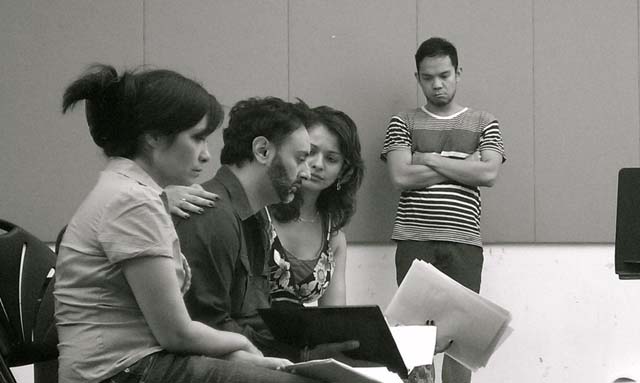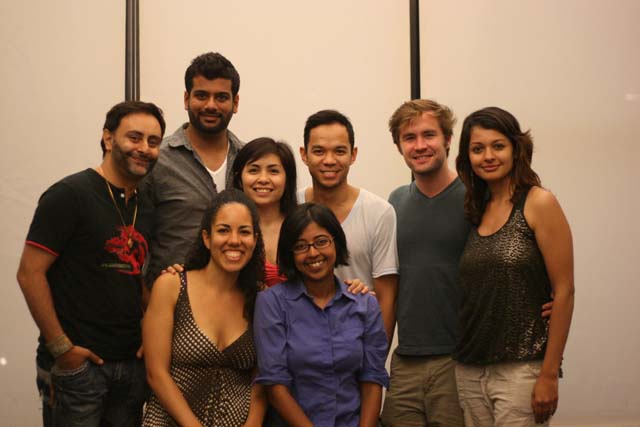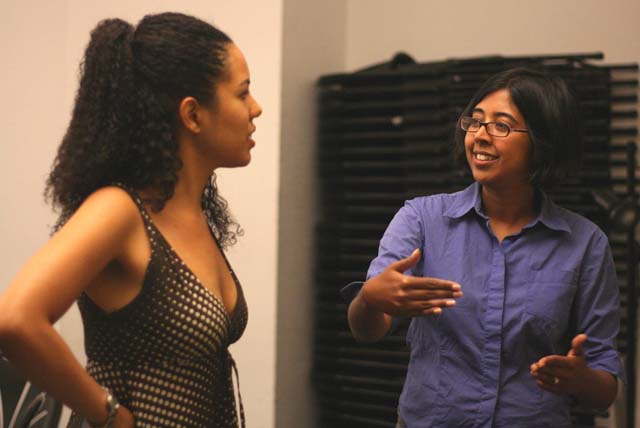
Remembering The World Trade Center Tragedy
Like all New Yorkers, Rehana Lew Mirza has turbulent memories of September 11. A writer who lived on West 4th and Sixth Avenue, she had traveled uptown for her day job as a real estate agent, when all the world seemed to come crashing down.
She was frantically trying to return downtown to her sister with whom she shared an apartment, but the subways had stopped, and there was mayhem everywhere. Her sister Rohi, who usually temps in the World Trade Center area, was at home that day. Mirza recalls, “I kept running to get to my sister. In the crowd, someone started cursing me out, screaming ‘F—— foreigners! You’re the cause of all this.’”
That night, aware of the rising backlash against Muslims, they remained barricaded in their one bedroom apartment, watching the horrific images on TV. A week after that, just as they were struggling to get back to work, Mirza found a flier pinned to her door: it had the image of a missing South Asian woman – and someone had burnt holes into the paper, into the eye-sockets and mouth with a cigarette.
It was at that chilling moment that she knew that for New York Muslims the tragedy was a double whammy – not only were they too the victims but were also being demonized as the perpetrators. “It prompted me to start writing and to try and negotiate the emotions that were going through me at the time,” she says. The result was ‘Barriers: 9/11 through Asian American Eyes’, a play that ran at Here Arts Center.
The above was part of a story I wrote for Newsday at that time of turbulence and grief when New Yorkers were shaken and in disbelief, and it seemed life would never be the same again. At that time, Mirza had told me, “The media had created an enemy and my goal ws to create a South Asian family that wasn’t composed of terrorists but was actually hurt by the terrorism.” Her sister Rohi, who was producer of the play said, “This play has come out as a response to slanted media depictions and a need to create a dialogue between communities.”
As NYTheater.com wrote at that time, “Mirza has chosen her medium well — Barriers reaches out and grabs us — wrenches us– to teach us something valuable about the state of the world.” (The play was later co-produced with the Asian American Theater Company in San Francisco and Los Angeles in 2003.)

Barriers, Ten Years Later
Hard to believe, ten years have passed – and in spite of the shattered lives and grief, life has gone on. Mirza, who is co-director of Desipina, a fusion theater company, has launched the play again. At the very same theater, with a new screenplay and cast and crew.
The play is written by Mirza, produced by Ying Le and directed by Colette Robert. The actors are Pooja Kumar, Sunkrish Bala, Joe Petrilla, Eileen Rivera, Jon Norman Schneider and Rajeev Varma.
Mirza, who has an MFA in theater from Columbia University, has also honed her art in the past decade. She is currently the co-director of the Ma-Yi Theater’s Writer’s Lab with her husband, Michael Lew. In the past, she has been a Leopold Schepp scholar, a 2G Resident Artist, and the recipient of an EST/Sloan Commission. She has also been a Princess Grace finalist, a Eugene O’Neill Playwrights Conference semi-finalist, and a Sundance Feature Film Lab finalist.
As Mirza herself points out, she is very different as a person and as an artist than she was ten years ago, and has tried to remove some of the melodrama and update the play so that it followed through on the relationships.
”Initially, I took some shortcuts as a young writer, and so now I’ve tried to flesh some of that out,” she says. “Since the play is also still set in 2002, in the months following 9/11, I also wanted to use some foreshadowing and show how far we may – or may not – have come as a nation.”

Barriers: Being Muslim and American, Post 9/11
What are her thoughts as the 10th anniversary of 9/11 approaches? “I have a lot of mixed feelings,” she says. “I feel a little disheartened about where we are as a nation in response to that tragic day. I feel a little bewildered that it’s been ten years already, when it feels so current. I also feel a little depressed, that the loss of that day has been twisted into something political.”
Does she think feelings about Muslim immigrants, The Other, have changed or are things still the same? She says, “I think initially post 9/11 there was a blanket hatred towards Muslims and immigrants. Now there is room for more nuance, but I do think that there is still a general disconnect when thinking of who the “enemy” is.”
She found the controversy of Park 51 bewildering for it ignored the diversity of New York and those affected by 9/11. Mirza also mentions the recent tragedy in Norway where attitudes were different when it was thought that the perpetrator was a Muslim terrorist. When it turned out to be a Christian man who hated immigrants and Muslims, she says, the sentiment turned to it being a ‘lone crazy person.’
“Also, there was a general sentiment that clearly he was crazy if he killed innocent Norwegians rather than Muslims and immigrants whom he was against,” she says. “Does that mean Muslims and immigrants cannot be innocent? I sit and troll Yahoo comments when I want to get depressed about the state of how Muslims and immigrants are viewed.”
So much has changed and yet so much remains the same. For Mirza, who happens to be of Pakistani and Filipina heritage and married to an Asian-American, this continued paranoia and distrust of ‘The Other’ is disturbing.
As 9/11 approaches and the angst and turmoil of that day is re-enacted on the stage, what does she hope audiences will take away from it all?
“I hope people will realize that despite all our differences, it is important to come together as a nation and that the diversity in this country is something to be embraced, and not ignored,” she says. “ I also hope that South Asian Americans will realize how important it is to support artists and stories that aren’t being told in the mainstream. “
New Yorkers will get a chance to do that by witnessing ‘Barriers’ and expressing solidarity with these sentiments. The September 11 performances of the play are being presented by Indo-American Arts Council (IAAC) and Desipina & Co to commemorate 9/11 and proceeds will benefit the Neil Shastri Foundation. Neil was one of the young Indian-Americans who died in the Twin Towers on 9/11.
The Barriers Benefit includes a pre-performance reception with the playwright, director and cast followed by a discussion and Q and A. The play follows at 7 pm
There are a total of 12 performances. More details at Here.org
